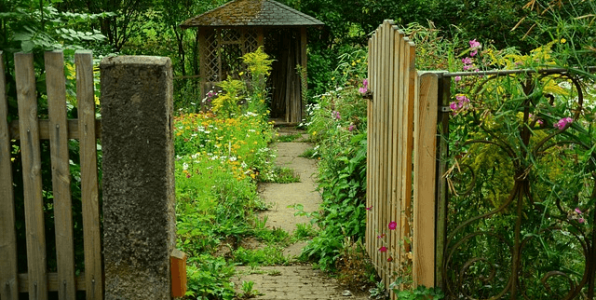The Ultimate Guide to Choosing the Right Gate Hinges

The Ultimate Guide to Choosing the Right Gate Hinges
Have you ever considered the importance of gate hinges in maintaining the efficiency and durability of your gates? Choosing the right hinges can make a significant difference in the overall functionality and longevity of various types of gates. In this guide, we’ll explore the world of gate hinges and provide you with the essential knowledge to make an informed decision.
Short Summary
- Understanding the types and applications of gate hinges is essential for choosing the right one.
- Professional installation, regular maintenance, and timely replacement are key to ensuring optimal performance.
- Consider weight, size, budget & security when selecting automated options such as swing or slide kits.
Understanding Gate Hinges: Types and Applications

Selecting the right gate hinges is crucial for the efficiency and durability of your gate. With so many different types of hinges available, it’s essential to understand their specific applications and choose the one that best suits your needs. The type of hinge you choose should be determined by factors such as the weight of the gate, the materials used, and the intended use of the gate.
Heavy duty gate hinges, garden gate hinges, and field gate hinges are some of the most common types available, each designed to cater to specific gate requirements. Let’s dive deeper into these types of hinges and their specific applications.
Heavy Duty Gate Hinges
Heavy duty gate hinges are designed to support larger and heavier gates, typically made of galvanized steel or stainless steel. These hinges can bear weights of up to 1000 lbs and are a suitable option for wooden gates with the use of T-hinges. Some common types of heavy duty gate hinges include T-hinges, strap hinges, and butt hinges.
The benefits of using heavy duty gate hinges include enhanced durability and the ability to support heavier gates. They also offer increased resistance to corrosion and wear and tear, making them ideal for outdoor applications.
When selecting heavy duty gate hinges, it’s important to consider the weight of the gate, the material of the gate, and the environment in which the gate will be installed.
Garden Gate Hinges
Garden gate hinges are specifically designed for use with gates in gardens. These hinges come in various types, including T-hinges, butt hinges, and strap hinges, and are typically constructed from galvanized steel. When selecting a garden gate hinge, it’s essential to consider the weight and dimensions of the gate.
Not only do garden gate hinges offer a secure and reliable closure, but they also provide an attractive addition to your garden gate. To ensure optimal performance and prolong the lifespan of your garden gate hinges, it’s important to conduct regular maintenance and replace them when signs of wear and tear are observed.
Field Gate Hinges
Field gate hinges are heavy-duty hinges designed for use in open fields and farms. They are available in various sizes and materials, including galvanized steel. Adjustable field gate hinges are a versatile option that can be used on all 5 bar gates and allow the gates to swing in both directions.
The proper placement of hinges on 5 bar gates, with the larger hinge affixed to the top rail of the gate and the smaller hinge secured around the stile of the gate, is essential for optimal support. Field gate hinges are engineered to endure extreme weather conditions and guarantee safe access to rural properties.
Gate Furniture Essentials

In addition to hinges, other gate hardware components are necessary for proper installation and functioning of your gates. These essential gate furniture components include latches, hooks and eyes, handles, and cane bolts. Gate furniture is available in various materials, such as stainless steel, wrought iron, aluminum, bronze, black iron, copper, and brass, as well as softwoods like Redwood and Red Cedar for wooden gates.
When selecting gate furniture, it’s important to consider factors such as the material, size, and style of the gate, as well as the climate and environment in which the gate will be installed. Furthermore, security needs and the budget of the project should also be taken into account.
Hooks and Eyes
Hooks and eyes are a type of gate hardware used to ensure secure closure or hold gates open. They consist of a metal hook and an eye that the hook fits into. Hooks and eyes are offered in a range of sizes and styles, including standard, heavy-duty, and decorative.
The installation of hooks and eyes is straightforward and provides a secure closure for gates. Additionally, they are cost-effective and can be used with multiple gate materials. When installing hooks and eyes, it’s essential to choose the correct size and type for the gate material and use the appropriate screws and anchors.
Latches and Locks
Latches and locks are mechanisms employed to secure gates, with various types available, including padlocks, keyed latches, mechanical keyless, electronic keyless, and smart locks. Employing latches and locks provides enhanced security and convenience, allowing you to easily manage access to your property and integrate the locks with other security systems.
When selecting a latch or lock, consider factors such as the size and weight of the gate, the type of gate (swing or sliding), your budget, and the level of security required.
Measuring and Installing Gate Hinges

Proper measurement and installation of gate hinges is crucial for the overall functionality and longevity of your gate. It is essential to accurately measure the height and width of the hinge, as well as the weight of the gate, to determine the appropriate hinge dimensions. The recommended size of the hinge should be at least half the width of the gate.
To install the gate hinges, they should be affixed to the gate frame and the gate post, with the hinge pins oriented towards the gate post. After installation, it’s important to confirm that the hinges are firmly secured and that the gate opens and closes properly.
Determining Hinge Width
Calculating the correct hinge width based on gate dimensions and weight is essential to ensure the strength and durability of the hinge. It is generally recommended that the hinge length be one third of the width of the gate or door it is fitted to, with the exception of Tee hinges which should be at least half the width of the gate.
When selecting the appropriate hinge for your gate, it’s important to consider the weight and size of the gate to ensure the hinge can withstand the stresses and strains of usage.
Installation Tips
Installing gate hinges properly is crucial for the overall functionality and longevity of your gate. To ensure the hinges are placed in the desired position on the gate and are level, packers or wedges can be utilized to keep the gate in place while fitting the hinge pins.
Drilling pilot holes and attaching the hinge with screws is essential for successful installation. To avoid any potential issues during installation, always use the appropriate screws and anchors for the gate material.
Gate Automation Options

Automating your gates can offer convenience, security, and safety, as well as potential cost savings over the long term. Gate automation options include swing, sliding, bi-folding, and telescopic gates, with various materials and motor sizes to choose from. Heavy duty rails are necessary for 5 Bar and Driveway gates in order to ensure they can withstand the stresses and strains of automation movement.
Whether you choose to automate your gate for increased security or simply for the convenience of not having to manually open and close the gate, there are a variety of options available to suit your needs.
Swing and Slide Automation Kits
Swing and slide automation kits are systems that can be integrated with existing gates to enable automated operation. Swing gates can be automated with a swing gate motor kit, while sliding gates can be automated with a sliding gate opener kit. Swing gate motor kits tend to be more cost-effective and simpler to install, while sliding gate opener kits provide enhanced security and require less upkeep.
When selecting an automation kit, consider factors such as the size and weight of the gate, the type of gate (swing or sliding), your budget, and the level of security required. Additionally, take into account the installation process and maintenance requirements.
Professional Installation

Hiring a qualified installer for your gate automation project is crucial to ensuring safety and compliance with regulations. A professional installer can offer enhanced security, convenience, and safety, as well as potential cost savings over the long term. Gate Safe is a great resource for finding qualified installers. Alternatively, you can get more information from the Door & Hardware Federation (DHF).
Ensuring safety and compliance with regulations when installing automated gates is essential to avoid accidents and guarantee that the gates are installed correctly. Additionally, this will ensure that your gates are compliant with local building codes and regulations.
Maintaining and Replacing Gate Hinges
To ensure the longevity and optimal performance of your gate hinges, it’s important to conduct regular maintenance and replace them when signs of wear and tear are observed. Proper maintenance includes cleaning the hinges routinely, lubricating them with heavy-duty grease or spray-on white lithium grease, and securing any loose screws or bolts.
Signs that it may be necessary to replace gate hinges include rust, corrosion, and loose screws or bolts. To replace gate hinges, first remove the existing hinges and accurately measure the width of the gate. Subsequently, select hinges of the appropriate size and install them in accordance with the manufacturer’s instructions.
Regular Maintenance
Regular maintenance of gate hinges is essential for their optimal performance and longevity. It is recommended to clean gate hinges regularly and lubricate them with heavy-duty grease or spray-on white lithium grease every six months to a year, depending on usage. Regular cleaning of gate hinges helps to avoid the accumulation of dirt and debris, which may lead to damage.
Lubricating gate hinges can help to decrease friction and minimize the deterioration of the hinges, thus extending their lifespan. After lubrication, it’s important to wipe away any excess grease with a clean cloth or paper towel.
Signs of Wear and Tear

Indications of wear and tear of gate hinges may include rust, squeaking, and difficulty in opening or closing the gate. Regular inspection and lubrication of gate hinges can help to avoid wear and tear and prolong the lifespan of your hinges.
If you notice any of these signs, it may be time to consider replacing the hinges to ensure the continued functionality and security of your gate.
Summary
In conclusion, selecting the right gate hinges and additional gate furniture is crucial for the efficiency, durability, and security of your gates. By understanding the various types of hinges and their applications, measuring and installing them correctly, and performing regular maintenance, you can ensure the longevity and optimal performance of your gates. Whether you’re looking to install a heavy-duty gate, a garden gate, or automate your gate system, this comprehensive guide provides you with the essential knowledge to make an informed decision and keep your gates functioning at their best.
Frequently Asked Questions
What are the best hinges to use for gates?
When it comes to hinges for gates, Butt Hinges are the preferred choice due to their stainless steel construction and stainless steel screws, making them resistant to corrosion. This makes them ideal for use outside on lightweight gates, allowing them to take a good amount of weight.
Overall, Butt Hinges offer an optimal solution when looking for the best hinges for gates.
What is the max weight for gate hinges?
Based on common advice, the maximum weight for gate hinges is up to 3000 lbs when using ball bearings gate hinges. These heavy-duty hinges are suitable for high-traffic gates and are often used in commercial, residential, and industrial applications.
They are designed to be durable and reliable, and can withstand a wide range of temperatures and weather conditions. They are also easy to install and require minimal maintenance.
Gate hinges are an important feature.
What are the best internal door hinges?
For optimal performance on interior doors, ball bearing hinges are the way to go. They provide a smooth and quiet operation, reducing friction and wear over time for frequent use. That’s why they remain the most popular choice for internal door hinges.
Comments are closed